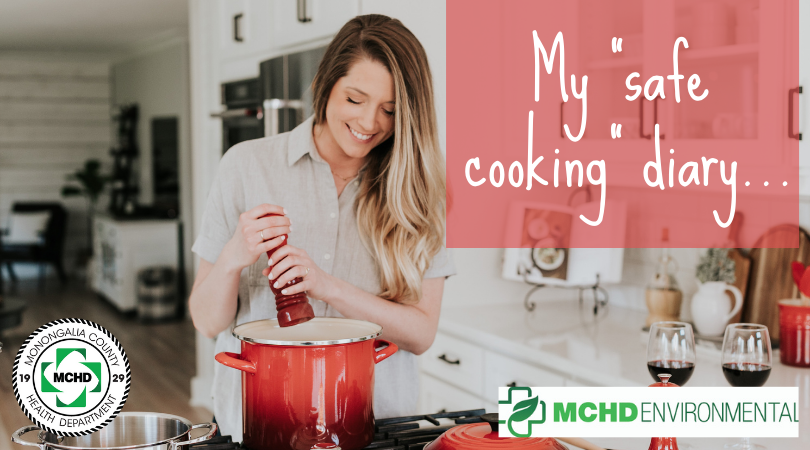How I learned my very important lesson about food safety & cooking

Sep. 15, 2021
By Katie Minor
If you’re anything like me, last year’s quarantine might have provided you with the perfect opportunity to sharpen your cooking skills. Maybe you finally opened that cookbook you got last Christmas or invested in a properly seasoned cast-iron skillet.
To me, frozen dinners and takeout were no more. After binge watching the food network for a few days, I decided to show off my new culinary knowledge by cooking a fancy glazed chicken for myself and my partner one night. One very messy kitchen later, we admired the beautifully plated dish, poured the wine and took our first few bites before seeing it: The inside of the chicken was bright pink.
It didn’t just damage our digestive systems. My ego was bruised, my confidence shattered. Bobby Flay had failed me. Okay, I’m being dramatic. Maybe that mistake had to be made! It taught me a very important lesson about food safety.
September is Food Safety Education Month, and according to the Food & Drug Administration (FDA), there are about 48 million cases of foodborne illnesses annually in the U.S. — that’s about 1 in every 6 Americans each year. Food poisoning isn’t always just an upset tummy, either. Each year, these illnesses result in an estimated 128,000 hospitalizations and 3,000 deaths.
Most symptoms of foodborne illness are vomiting, diarrhea and abdominal pain. Symptoms usually occur within one to three days of eating the contaminated food, but can also occur in as little as 20 minutes or as long as six weeks.
The disease-causing organisms that cause foodborne illnesses can be found on all sorts of food sources, from undercooked meats to contaminated fruits and vegetables. Young children, elderly people and those with compromised immune systems are at the greatest risk for contracting a foodborne illness, but certain organisms pose a grave threat to everyone, regardless of age.
Luckily, there are a few simple steps you can follow to reduce the risk of foodborne illnesses. To keep your family safe (and to prevent future heartbreak in the kitchen), follow these four simple steps: Clean, Separate, Cook, Chill.
- Clean: Wash hands and surfaces often. Hopefully COVID-19 has conditioned us to always practice proper hand washing, but it’s also important to clean surfaces such as cutting boards, countertops and utensils. Remember to rinse fresh fruits and vegetables under running water.
- Separate: Keep raw meats away from other foods. Raw meat and eggs should be stored away from other foods, from your grocery cart to your refrigerator. Use one cutting board for raw meat and one for produce.
- Cook: Cook your food to the right temperature. I bought a meat thermometer the day after my chicken incident, which might be the most important tool in my kitchen now. You can check the proper internal temperature for foods using this chart (https://www.fda.gov/media/107000/download). You should also always bring sauces, soups and gravy to a boil before serving.
- Chill: Refrigerate your food promptly. You should refrigerate or freeze perishables within two hours of cooking, making sure your refrigerator has an internal temperature of 40 degrees Fahrenheit or lower. Your freezer should be at zero degrees Fahrenheit or lower. Large amounts of leftovers should be separated into shallow containers for quicker cooling.
These four rules are always on my mind when I’m in the kitchen, and I’m pleased to say I haven’t had an unpleasant experience since then.
These steps should also be taken at work for anyone in the food service industry. They provide a great baseline knowledge for a professional kitchen, but there is so much more to learn to become a food safety expert.
That’s why Monongalia County Health Department offers online food safety training. The training is provided through StateFoodSafety.com and costs $20 to take. It’s about two hours long and you must pass a test at the end.
You also have the option to attend in-person food safety training at the health department. You can see the full schedule on our website.
Food safety is in our hands. Remember to clean, separate, cook, and chill — and don’t make the same mistake I did!
Katie Minor is the public information office assistant at Monongalia County Health Department.